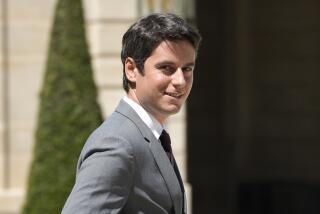Chirac Changed Style, Positions in Pursuit of French Presidency
- Share via
PARIS — Jacques Rene Chirac, the new leader of France, is a flamboyant, doggedly energetic political survivor who has long worn his presidential ambitions on his sleeve, inspiring both deep loyalty and intense hatred.
Although Chirac, 62, has spent his lifetime in politics, as mayor of Paris for the past 18 years, member of Parliament and two-time prime minister, the seeds of his victory Sunday were planted far outside Paris.
For two years, since he led his conservative coalition to control of the National Assembly, he has traveled the country, hosting small round-table meetings and listening to community leaders.
His goal, and he made no secret of it, was to succeed Francois Mitterrand, the retiring Socialist president. But his forays into the countryside made him the first candidate to fully recognize the profound dissatisfaction of voters worried about unemployment and the widening gap between the political elite and average citizens.
And Chirac sensed, after presidential election losses to Mitterrand in 1981 and 1988, that he needed to change his platform and his image.
Although part of the political elite, having graduated from the prestigious Ecole Nationale d’Administration and spent years in the halls of power, he cast himself as the instrument of change.
Long a supporter of business and a major proponent of free-market solutions, Chirac began to rail about “a France of inequalities.” He complained about a France “where money goes to speculators and wheeler-dealer businessmen and where salaries are too low for nurses, social workers, magistrates, teachers.”
Then he set about changing his personal image as well.
He had always been a charming man in small groups and serenely at home on the campaign trail, where his supporters unfailingly addressed him with the informal tu. But he also had a reputation as a hothead, and evidence of that showed up most markedly on television.
“Before, Chirac had an image of a man who was extremely contradictory, uncertain, agitated and nervous,” said Pascal Perrineau, head of the Paris-based Center for the Study of French Political Life. “But at the beginning of this year, he began to change.”
Critics charged that Chirac had changed too often, and they warned that his only constant was his political ambition. But his supporters countered that Chirac was merely changing with the times.
Chirac was born in Paris, the son of a company executive. But his roots are in Correze, a small village in south-central France that he represented in Parliament.
During his school days, he spent a summer studying at Harvard University. He remains fluent in English, reads history and poetry and is fascinated by Chinese and Japanese civilizations.
Chirac and his wife, Bernadette, have been married 39 years and have two biological daughters, Laurence, 35, a doctor, and Claude, 32, who worked as her father’s media adviser during the campaign.
During the campaign, it emerged that the Chiracs had adopted a teen-age Vietnamese refugee, Anh Dao, nearly 10 years ago. She was married last year, and now has a child, Chirac’s only grandchild.
The family has not been without its personal tragedies, although they have been little reported in France. Laurence was critically injured when she fell from a window in 1988 and spent some time in a wheelchair. And Claude’s husband committed suicide only a few months after their marriage.
More to Read
Sign up for Essential California
The most important California stories and recommendations in your inbox every morning.
You may occasionally receive promotional content from the Los Angeles Times.














